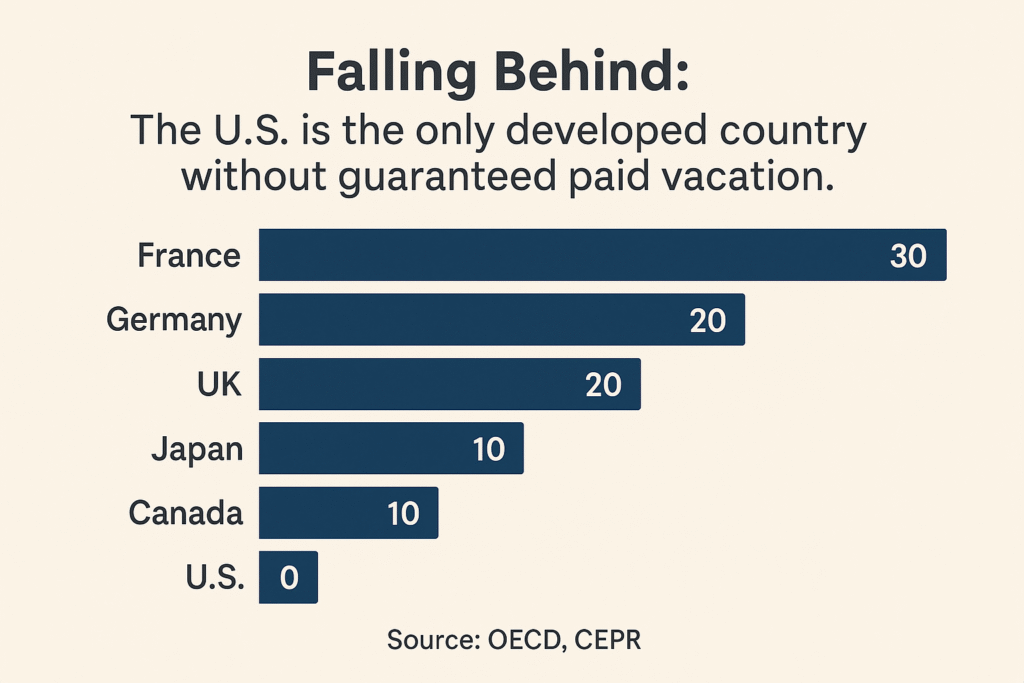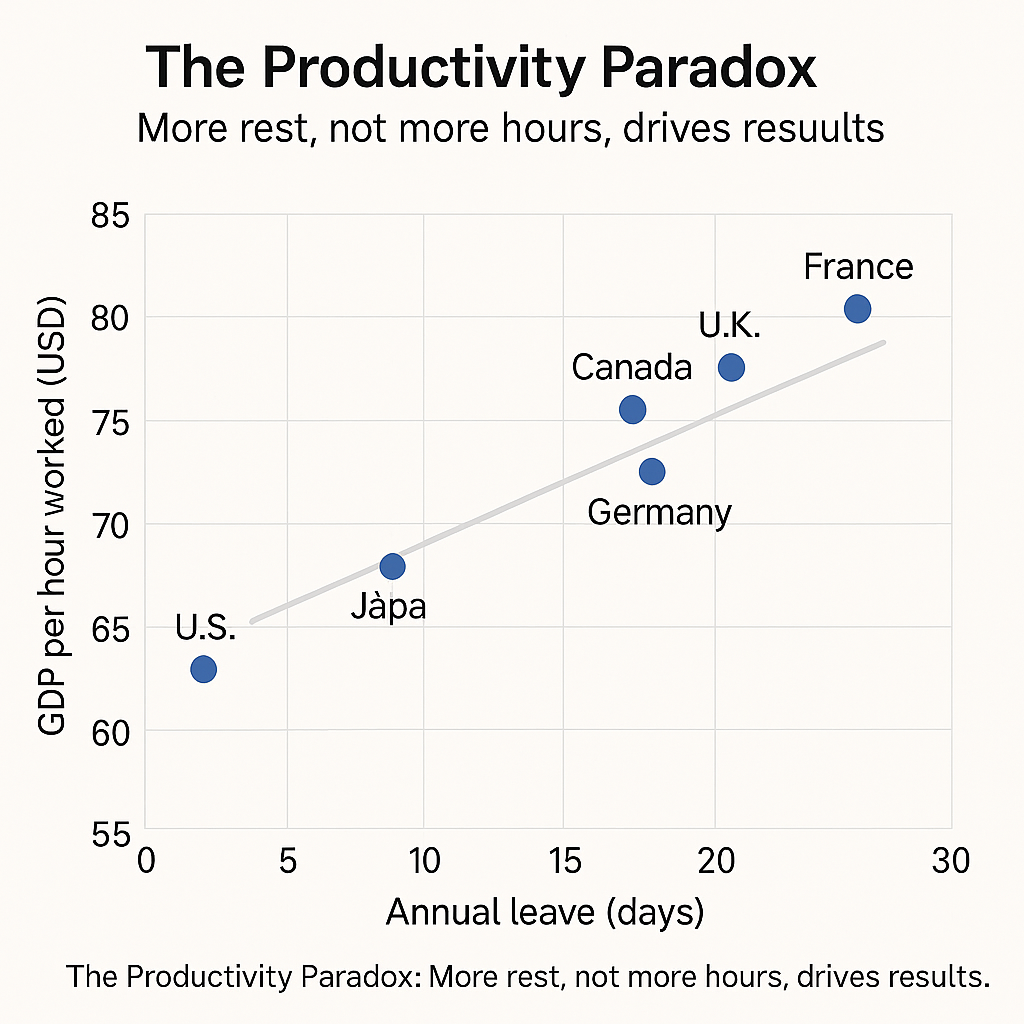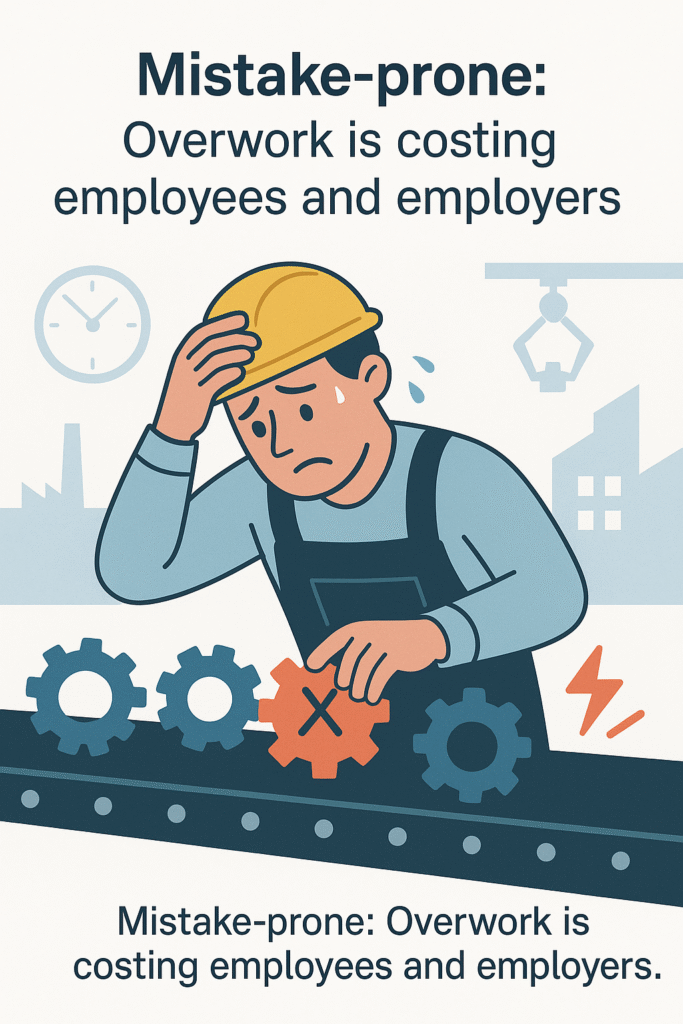In a nation where burnout is practically a badge of honor, it’s time for the United States to reevaluate one of its most toxic cultural norms: overwork. American workers are among the most productive on Earth, but they also rank near the bottom when it comes to paid time off. In fact, the U.S. is the only advanced economy that does not guarantee paid vacation by law. It’s a national shame—and one that must change.
We propose a simple yet transformative solution: 28 mandatory days of paid vacation annually for every U.S. worker. Not accrued. Not optional. Guaranteed.
Overworked and Under-Rested: A National Epidemic
America’s work culture glorifies hustle but ignores the human cost. Surveys from Gallup and the American Psychological Association reveal that stress, anxiety, and burnout are at all-time highs. According to the Bureau of Labor Statistics, full-time American workers average just 11 days of paid vacation per year—and many don’t take even that.
Contrast that with European nations like France (30 days), Germany (20 days minimum plus public holidays), and even the UK (28 days). These countries not only outpace the U.S. in paid leave but also report higher employee satisfaction and better health outcomes.

The Productivity Myth: More Hours, Less Output
It might seem counterintuitive, but more work hours do not equal more productivity. Numerous studies, including those from Harvard Business Review and OECD, show that long workweeks lead to diminishing returns. In fact, countries with more vacation time often boast higher hourly productivity rates.
Employees who are well-rested are sharper, more creative, and more efficient. Vacation is not a luxury; it’s a productivity tool.
Mental Health Crisis: The Hidden Cost of No Time Off
Work-related stress is now recognized by the World Health Organization as a major contributor to mental illness. Depression, anxiety, insomnia, and substance abuse are increasingly tied to relentless work schedules.
By mandating 28 days of vacation, the U.S. could make a serious dent in this crisis. More time off means more opportunities for rest, family connection, exercise, and therapy—all essential components of mental well-being.
Economic Inequality and Paid Leave
Paid vacation in the U.S. is a class issue. High-income, white-collar workers often enjoy generous leave policies, while service workers, part-timers, and gig economy laborers get little or none.
A federal mandate would level the playing field. Every worker—regardless of industry or income—would have the same right to rest and recover. This could reduce turnover, improve morale, and foster long-term job satisfaction across economic lines.
The Global Standard: Why the U.S. Is a Stark Outlier
Among industrialized nations, the United States is alone in failing to offer any statutory paid vacation. According to the Center for Economic and Policy Research (CEPR), the average OECD nation guarantees at least 20 paid days off per year, not including public holidays.

Our lack of a vacation policy not only makes us look backward; it also hampers our global competitiveness. Foreign talent is increasingly choosing to work in countries that offer better work-life balance. Even multinational companies headquartered in the U.S. often offer better benefits to employees abroad than they do stateside.
The Economic Argument: Vacation Fuels Spending
Critics argue that mandatory vacation would be too expensive for businesses, especially small ones. But this claim doesn’t hold up under scrutiny. Time off often results in increased spending in hospitality, travel, entertainment, and retail—industries that fuel the broader economy.
Moreover, well-rested employees take fewer sick days, are less likely to burn out, and are more engaged at work—all factors that reduce costs in the long run.

Case Study: The 4-Day Workweek Movement
Companies that have experimented with reduced work schedules (including a mandatory 4-day work week) have seen measurable success. Microsoft Japan, for example, reported a 40% increase in productivity. Dozens of U.S.-based pilot programs are showing similar results.
If fewer workdays per week can improve output, imagine what four full weeks of vacation could accomplish.
Counterarguments and Rebuttals
1. “Small businesses can’t afford it.”
Federal subsidies or tax incentives could ease the transition, similar to those used in paid family leave policies. The benefits in employee retention and morale would quickly outweigh the costs.
2. “Americans won’t take the time off anyway.”
Mandates can shift culture. When leave is normalized and protected, people use it. In countries where vacation is the law, it’s part of life—not a guilty pleasure.
3. “It will hurt productivity.”
The opposite is true. Burned-out employees are less efficient. More time off leads to better mental health and sharper focus at work.

What 28 Days Would Look Like
Imagine a future where every American has a month to breathe. Workers could:
- Travel to see distant family
- Recover from health setbacks
- Enroll in personal or professional development courses
- Volunteer in their communities
- Disconnect, reset, and return more focused
And businesses would benefit, too. Less turnover. Stronger loyalty. Better performance.
Building a Healthier, Happier Workforce
Mandatory vacation isn’t just about time off. It’s about dignity, balance, and acknowledging that human beings are not machines. By implementing a 28-day vacation policy, the U.S. would take a monumental step toward creating a healthier, more humane workplace.
We have the data. We have a global precedent. What we need now is political will—and a cultural shift toward valuing rest.
The Road to Legislation
Such a policy would require a federal mandate, likely administered by the Department of Labor. It would include:
- 28 paid vacation days annually for full-time workers
- Pro-rated vacation for part-timers
- Federal oversight and enforcement
- Exemptions or phased rollouts for microbusinesses
Public support is key. Movements like the Paid Leave for All campaign are already gaining traction. With proper advocacy, national law could follow.
The Moral Imperative
America is long-overdue for a transformation in how it treats its workers. A 28-day vacation policy would signal that we value not just labor, but life. It would help mend a broken system, uplift the working class, and offer a glimmer of peace in an otherwise frantic society.
Other nations have done it. The results are clear. It’s time for the United States to join the rest of the developed world.
It’s time to make rest a right, not a reward.
Sources
- Center for Economic and Policy Research (CEPR) – No-Vacation Nation Report: https://cepr.net/documents/publications/2007-05-no-vacation-nation.pdf
- OECD Employment and Labor Market Statistics: https://stats.oecd.org/
- American Psychological Association – Work and Well-Being Survey: https://www.apa.org/news/press/releases/stress
- World Health Organization – Occupational Burnout and Mental Health: https://www.who.int/mental_health/in_the_workplace/en/
- Harvard Business Review – Why You Should Take a Vacation: https://hbr.org/2021/07/why-you-should-take-a-vacation
- OECD Productivity per Hour Worked: https://data.oecd.org/lprdty/gdp-per-hour-worked.htm
- Gallup Workplace Reports: https://www.gallup.com/workplace/
- Paid Leave for All Campaign: https://paidleaveforall.org
- U.S. Bureau of Labor Statistics – Paid Leave Summary: https://www.bls.gov/ncs/ebs/benefits/2023/


